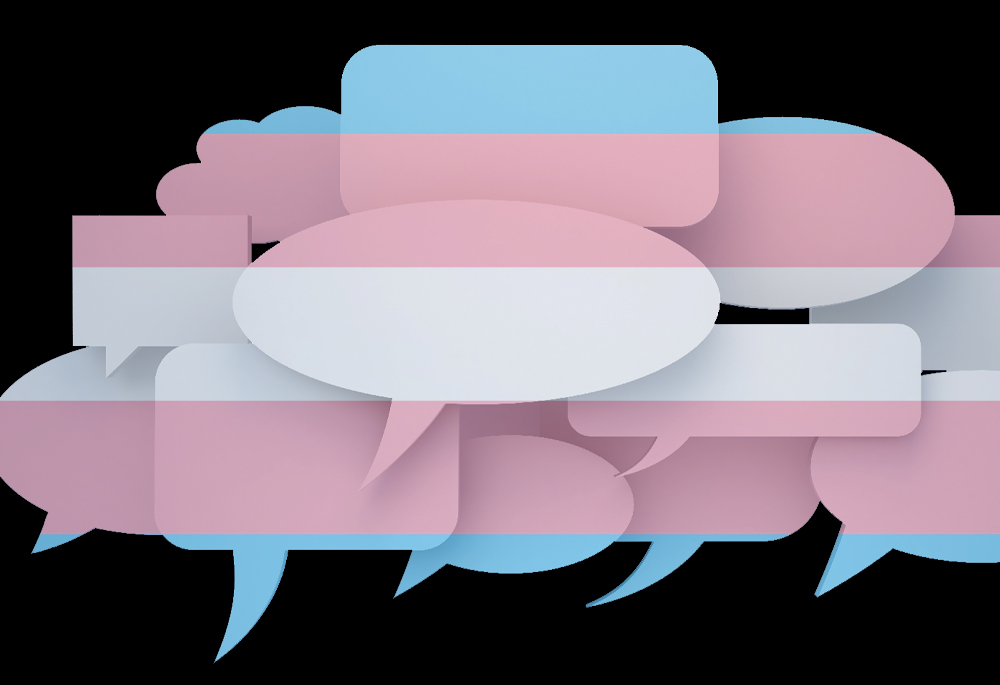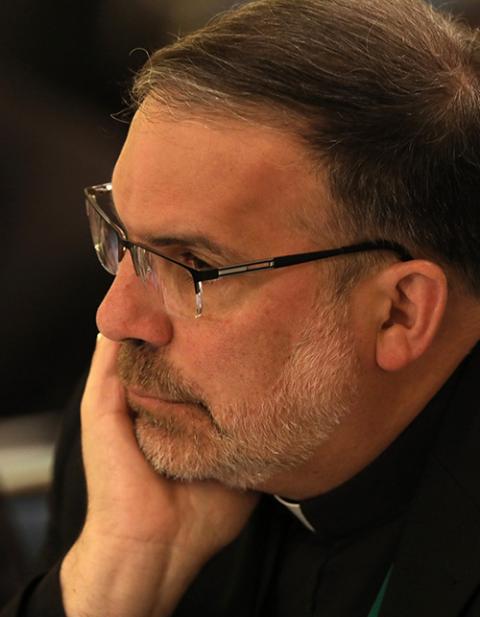
(NCR graphic/Teresa Malcolm; Dreamstime/123dartist)
As the number of state-based bills and Catholic diocesan policies that impact — and critics say harm — transgender individuals mount, a group of more than a dozen U.S. bishops gathered for a private meeting at St. Louis University in January to listen to trans people and their families, as well as to theologians, medical professionals and those in church ministry.
The day-and-a-half-long event was organized by New Ways Ministry, a Catholic LGBTQ advocacy group, and closed to the public and press. Participants told NCR the intent of the meeting was to help bishops better understand the experience of trans people and inform the pastoral care in their respective dioceses.
How trans people are viewed and welcomed varies widely across dioceses and parishes, with some offering robust LGBTQ outreach and others adhering to policies that circumscribe LGBTQ participation in church life.
Bishop John Stowe of Lexington, Kentucky, was among the approximately 40 total attendees in St. Louis.
The bishop, a member of Order of Friars Minor Conventual and longtime advocate for the LGBTQ community, said he felt there was a consensus after hearing from medical experts and from transgender people "that we are not talking about something that is fabricated, that people have a right to be called as they wish to be called."

Bishop John Stowe of Lexington, Kentucky, in a 2019 file photo (CNS/Bob Roller)
"And if we would all stop and hear the struggles that individuals went through," said Stowe, "we'd realize this is not just an issue of gender theory; it's people's lived experience."
The bishops present were eager to attend, according to Stowe, though not all invited prelates could make the trip. "We've all encountered pastoral situations related to transgender persons and for the most part felt inadequately prepared to deal with them," he said.
This is the second such meeting for bishops organized by New Ways Ministry, a nonprofit co-founded in 1977 by Loretto Sr. Jeannine Gramick. The religious sister was barred from ministering to LGBTQ Catholics in 1999 by then-Cardinal Joseph Ratzinger, the future Benedict XVI, but in recent years has been praised and befriended by Pope Francis.
Francis has called "gender ideology" dangerous because it "blurs the differences and the value of men and women." But he has met repeatedly with transgender people, and late last year approved a document saying trans individuals may be baptized or be godparents as long as the "danger of scandal" is avoided.
The first News Ways Ministry event for bishops was held in January 2023 at Georgetown University in Washington, D.C., and focused more broadly on LGBTQ individuals "in light of Pope Francis' continued call for church leaders to reach out pastorally to LGBTQ people," read a statement from the organization given to NCR last year.
New Ways Ministry chose not to comment on this year's gathering, which took place under the "Chatham House Rule" — meaning attendees can recount publicly what was discussed, but not identify who made any given comment. The goal of that agreement was to allow participants to speak more feely, attendees told NCR.
Advertisement
Dominican Fr. Charles Bouchard is the retired senior director of theology and sponsorship for the Catholic Health Association of the United States. He attended the event in D.C. and said the meetings have provided bishops "a safe space to really talk about what they want to talk about, to hear things and speak candidly without any pressure."
Stowe said listening to transgender individuals in St. Louis share about their faith journeys, their struggles and their transitions "was powerful and moving."
The New Ways Ministry statement said in 2023 that the impetus for the first meeting grew out of prior conversations and questions among bishops "and others concerned about ministry to LGBTQ people."
"The focus of the discussions was how to respond pastorally to LGBTQ people and their family members, in order to show the welcoming invitation of the Catholic Church," said New Ways Ministry.
The organization added that the event was not designed to produce any unified statement or agreement among the participants, and no overarching pastoral or theological plan was formed.
In the United States, more than 25% of dioceses now have documents focused on LGBTQ people, primarily students in Catholic schools, with the bulk saying names and pronouns, bathroom use, and attire must correspond to students' assigned sex at birth.
The U.S. Conference of Catholic Bishops currently is revising its official ethical directives for American Catholic health care institutions. It is expected to align the directives with a doctrinal note issued last March by the U.S. bishops' doctrine committee that says gender-affirming medical treatments must not be performed by Catholic providers.








